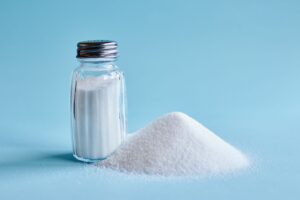
If you’ve ever been to the dentist, you’ve likely already learned that avoiding sugary foods can prevent oral problems like cavities and gum disease. They attract harmful bacteria that can erode your enamel or penetrate beneath your gum line, so limiting your consumption can boost your dental well-being.
Many patients wonder whether it’s safe to replace their favorite sweet snacks with something salty, instead. If you’re asking yourself whether salt is healthier for your smile, continue reading to learn more about the pros and cons!
How Salt Can Help Your Teeth
In smaller doses, salt can benefit your mouth in a few ways. Some potential pros of this ingredient include:
- It’s a natural disinfectant. If you have a damaged or aching tooth, your dentist might encourage temporarily using saltwater rinses to keep it clean instead of brushing. This is because salt is a natural disinfectant that clears away unwanted bacteria without abrasive chemicals that can cause irritation or discomfort.
- It has a neutral pH value. Tooth decay develops when harmful germs work in tandem with acids from the foods you eat to wear down your enamel. Salt, however, has a neutral pH balance which means it can counteract potential acid damage.
- It encourages healing. It’s not uncommon for your dentist to recommend gently rinsing with warm salt water after a procedure because it’s a gentle way to keep the site clean. For example, if you’ve had a tooth extracted then a blood clot must form over the site to prevent a painful condition called dry socket. A saltwater rinse can safely kill germs without harming the blood clot, which can hinder recovery.
How Salt Can Harm Your Teeth
As you can see, salt has some incredibly helpful benefits that can improve your grin in smaller, controlled doses. However, consuming too many sodium-rich foods can be detrimental because:
- Many starches are processed with it. Bread, crackers, and other carbohydrates that are processed with salt break down into sugar in your mouth. Plus, these foods become soft and sticky and can cling to your teeth when you chew them. That means you’re more likely to form plaque that causes oral issues.
- It can weaken your teeth. Your teeth and bones require a certain amount of calcium to stay in good condition. Unfortunately, diets high in salt increase how much calcium is lost through urine throughout the day. This leaves you at a higher risk of damaging your pearly whites as well as developing other conditions like osteoporosis.
Although some salt can be helpful for your dental health, it’s important to watch what you eat so you don’t overdo it!
About the Practice
At Boyd & Walther Dental Associates, people of all ages benefit from two dentists who offer a full array of services under one roof. With combined decades of experience between them, they’re familiar with everything from basic preventative needs to more complex solutions. Their goal is to provide top-quality care in a warm and welcoming environment so you can trust that your smile is in good hands. Plus, you’re sure to get only the most current treatments utilizing state-of-the-art technology. If you’re worried that you’ve developed cavities or gum disease, you’re welcome to request an appointment on the website or by calling (850) 878-4117.
